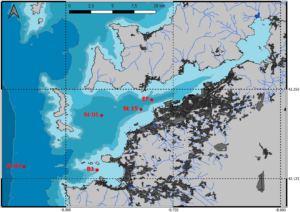‘Oceanographic Time Series in Northern Spain’ project (RADIALES-Norte)
The ‘Oceanographic Time Series in Northern Spain’ project (RADIALES-Norte; https://www.seriestemporales-ieo.net/) has been in operation since 1988 and is the longest-running observatory of the pelagic ecosystem on the continental shelf and adjacent ocean of NW and N Spain (North Atlantic Demarcation in the context of the Marine Strategies Framework Directive, MSFD). The project systematically measures oceanographic variables (temperature, salinity, nutrients, oxygen) and planktonic communities (microbial plankton, phytoplankton, zooplankton and ichthyoplankton) in 5 transects located off Santander, Gijón, Cudillero, A Coruña and Vigo. Sampling is carried out on a monthly/weekly basis, according to common working protocols, in accordance with international standards. Each section includes the sampling of fixed oceanographic stations, which correspond to characteristics of coastal, neritic and oceanic habitats. The sampling design is oriented towards obtaining time series of physical, chemical and biological (plankton) oceanographic data to define the spatial/temporal variability of the essential variables that characterise the pelagic ecosystem, their interactions, and relationships with natural processes (e.g. meteo-climatic forcing) and anthropogenic pressures and impacts in the study area. In this new phase of the project (2022-2026), in addition to maintaining the historical series of observations, the aim is to consolidate and refine the measurements of carbon system variables and the characterisation of plankton functional diversity by combining traditional methods, image analysis and omics technologies. In this phase of the project, in order to facilitate procedures and logistics, the administrative management will be carried out independently for the Vigo, A Coruña and Cantabrian RADIALES (RADCAN: Cudillero, Gijón and Santander sections). This is without compromising the coordination and integrated management of the data generated in each of the (sub-)projects, which together constitute the observation system for the pelagic ecosystem of NW and N Spain (RADIALES-Norte).
In the case of RADIAL-Vigo, the specific challenges for this new phase are based on the operability of the B/O Mytilus (planned to start in March-April 2022). They are, in addition to those already mentioned in the general context of RADIALES-Norte): 1) Consolidate the monthly sampling of the coastal-shelf section (stations RV15, RV1 and RV3, over 30, 40 and 100 m depth respectively), which has been compromised since the cessation of operations of the B/O J.M. Navaz in March 2017; 2) Extend the section towards the outer shelf, recovering station RV5 (z = 150 m); 3) Implement a weekly sampling, of basic essential variables, that captures the sub-seasonal variability of the estuary-shelf system, linked to the coastal upwelling cycles during the upwelling season (March-September), to the continental fluvial and runoff inputs and to the spring and autumn transitional periods (station RV1 and RV3); and 4) Strengthen cooperation with other agents involved or interested in the monitoring of the pelagic ecosystem in the estuaries and adjacent continental shelf (e.g. INTECMAR). INTECMAR).
Long-term monitoring of the pelagic ecosystem is key to determine the environmental status of marine ecosystems, a central objective of several European environmental regulations (Water Framework Directives – WFD, and Marine Strategies – MSFD) and in line with the UN Sustainable Development Goals related to climate change (O13) and underwater life (O14).
Since 1987.


